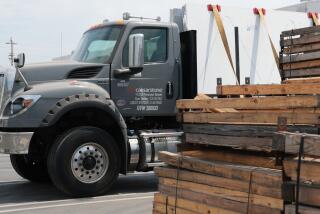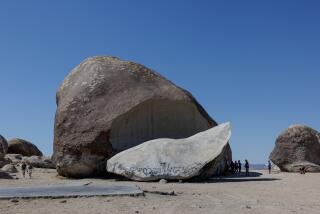An On-the-Rocks Business Is Booming : Innovation: An Escondido company’s line of artificial boulders means that homeowners no longer need Hercules or a crane for naturalistic landscaping.
- Share via
Nature so far has survived a rash of upstart imitators, from artificial turf to plastic petunias. Now, an Escondido businessman is producing its newest competitor--fake rocks.
Using a mixture of concrete and fiberglass, SimRock Industries has developed a line of artificial rocks that are being used in a variety of landscaping projects, from stand-alone boulders and rock wall paneling to small waterfalls and a swim-up island bar in a Mexican resort.
As a result, homeowners no longer need Hercules or a crane to put attractive, natural-looking rocks in their yards. For example, SimRock sells a 150-pound imitation of a 4-foot wide boulder that may weigh as much as 3,000 pounds in nature. The imitation sells for about $180. SimRock now produces about 200 small boulders a week, ranging from 18 inches to 6 feet in diameter.
Owner Darryl L. Phillips declined to discuss sales figures except to say that SimRock’s revenue last year was in excess of $1 million, and that sales have grown at an average annual rate of 20% since he founded the company in 1979.
But it is clear that business is booming at SimRock’s Escondido plant where 40 full-time workers are now employed. In coming months, Phillips plans to double the size of his manufacturing plant which now measures 10,000 square feet.
Phillips and his brother Lee, who is in charge of special projects, were in the pool construction business until a customer in the late 1970s requested that they build a rock diving platform. The Phillips brothers knew that getting a real boulder in place would be difficult because of the enormous weight.
Instead, they asked the customer if they could try to construct a lightweight imitation structure. Using a method commonly used on motion-picture sets, the brothers sculpted a fake rock platform using concrete and fiberglass. For competitive reasons, Phillips was reluctant to reveal more details of his rock-making process, except to say that his bogus boulders are hollow shells a few inches thick.
Thus, SimRock was born. And, with only five or six competitors nationwide--the nearest being in Los Angeles--the company says it is well-positioned to meet the growing local demand for natural-looking rock settings.
Perhaps SimRock’s most noteworthy project so far is the pool-bar at Villa Pal Mar Hotel-Resort in Puerto Vallarta. Guests who want to belly up to the bar swim to the center of the pool, under an exotic-looking waterfall made by SimRock to one of 27 underwater stools, which are also made of artificial rocks.
The bartender gets to the island via a small footbridge, and then serves from a dry pit in the center of the bar.
One highly visible SimRock project is the entrance landscaping to Carmel Mountain Ranch just off Interstate 15 on Carmel Mountain Road. “They drive by that thing by the thousands, and only a fraction of them know that it’s fake,” Darryl Phillips said.
In the past, SimRock generally designed and installed its own products in landscaping contracts that ranged in value from $20,000 to $500,000. But the company recently began making its products available to outside landscapers and do-it-yourselfers.
In addition to sculpting large rocks, the company also uses latex molds taken from real rocks in the wilderness. The boulders are permanently colored with acid stains, giving customers unlimited combinations of textures and colors, he said.
Don Edson, a San Diego architect who has worked with SimRock on several housing projects in the last eight years, said the demand for the company’s services “definitely” is growing.
The growing demand among homeowners for water settings that are in tune with their rocky surroundings has helped SimRock’s business.
Kelly Lerach said SimRock did about $30,000 of landscaping in the front yard of her 3-acre Rancho Santa Fe home about a year ago, including three waterfalls and a large koi fish pond.
“It’s gorgeous,” she said. “It sounds like you have a river flowing outside your house.”
So far, the fake rocks show no signs of fading or crumbling, and it is impossible to tell them from the real thing, she said.
“It’s not like they’re Styrofoam. You can climb around on them,” she said. “No one walks in without making comments. It’s the focal point in the front yard.”
More to Read
Inside the business of entertainment
The Wide Shot brings you news, analysis and insights on everything from streaming wars to production — and what it all means for the future.
You may occasionally receive promotional content from the Los Angeles Times.









